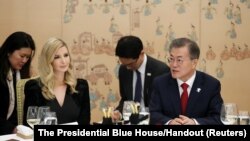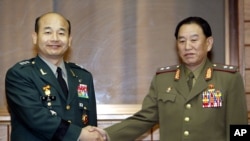Few expect any diplomatic breakthroughs from Ivanka Trump’s visit to South Korea to lead the U.S. delegation at the closing ceremonies of the Pyeongchang Winter Olympic Games.
The daughter of U.S. President Donald Trump paid a visit to South Korean President Moon Jae-in Friday at the presidential residence known as the Blue House, in Seoul, where she congratulated the president for hosting the Olympic Games and thanked him and the first lady for their hospitality.
Ivanka Trump delivered a persosonal message to Moon from her father, President Trump, about his announcement on sanctions for North Korea, a set of restrictions he called "the largest ever" for North Korea, imposing what the White House calls "maximum pressure" on the reclusive nation and its practice of illegal shipping and trade designed to evade United Nations sanctions targeting its nuclear and ballistic missile programs.
Ivanka Trump and Moon discussed the U.S. and South Korean efforts to apply "joint maximum pressure" on Pyongyang.
WATCH: Ivanka Trump statement after arriving in Seoul
The American delegation also joined the president and first lady, along with a South Korean delegation, for dinner and a musical performance at the Blue House.
Ivanka Trump and a senior White House adviser arrived in Seoul on Friday on a commercial flight. Apart from Friday's events, Trump is expected to stay away from politics, and will instead spend her time attending Olympic events.
According to U.S. officials she has no plans to meet with the North Korean delegation to discuss the nuclear standoff with the U.S., nor to meet with North Korean defectors to highlight the repression and ongoing rights violations committed by the Kim Jong Un government.
Trump said upon her arrival Friday: “It is a great honor to be here in South Korea with the U.S. delegation. We are very, very excited to attend the 2018 Winter Olympic Games to cheer for team USA and reaffirm our strong and enduring commitment to the people of the Republic of Korea.”
Sanctioned North Korean leader
Also lowering expectations for any new outreach is Pyongyang’s selection of Kim Yong Chul to head the country’s Olympic delegation at the closing ceremony. Kim is a North Korean general believed to be responsible for ordering a deadly attack on a South Korean naval vessel in 2010, while he was head of the Reconnaissance General Bureau, a top North Korean military intelligence agency.
North Korea has denied any involvement in the attack.
President Moon’s efforts to facilitate the North’s Olympic participation have been geared toward reopening channels of dialogue and engagement to find a peaceful way to halt Pyongyang’s continuous missile and nuclear tests, which are being conducted in large part to develop a nuclear-armed intercontinental ballistic missile to target the U.S. mainland.
South Korea agreed to permit Kim, the vice chairman of the North's ruling Workers' Party's Central Committee, to attend the games, even though he has been sanctioned by the U.S. and South Korea for his alleged role in the sinking of the South Korean Cheonan warship that killed 46 sailors, and for his involvement in the North’s nuclear development program.
"Under current difficult circumstances, we have decided to focus on whether peace on the Korean peninsula and improvement in inter-Korean relations can be derived from dialogue with (the visiting North Korean officials), not on their past or who they are," said Unification Ministry spokesman Baik Tae-hyun, in a media briefing on Friday.
The progressive Seoul government’s decision to overlook Kim’s combative past has drawn fierce criticism from conservatives in South Korea. On Friday, some 70 members of the main opposition Liberty Korea Party staged a protest in front of the presidential Blue House demanding the government withdraw its decision.
"If he sets foot on South Korean soil, he should be arrested (without a warrant) or be even killed,” said Kim Sung-tae, a leader of the Liberty Korea Party, during a General Assembly meeting on Thursday.
Joshua Stanton, a U.S. attorney who helped draft the North Korea Sanctions Enforcement Act for the House Foreign Affairs committee, told VOA's Korean service that Kim's selection as head of the delegation was a power play.
"This is North Korea's way of threatening the United States and South Korea. To say, 'Here's what's coming next if you don't make changes in your policy to our benefit,' " Stanton said.
William Brown, professor of North Korean studies at Georgetown University and intelligence specialist, told VOA, "Seems like this would be a very good case for the South Korean government to stand up and say no."
Mixed messages
The participation of the high-profile Trump family member and the hawkish high-ranking North Korean official at the Olympics closing ceremony present a mirror image of the opening ceremony, when U.S. Vice President Mike Pence attended, along with Kim Yo Jong, the sister of the North Korean leader, who was often referred to in the media as the “Ivanka Trump” of North Korea.
Some North Korea analysts speculate the hardline Kim Yong Chul was chosen for the closing to match Vice President Pence’s harsh rhetoric during the opening ceremony.
During his visit to South Korea, Pence met with North Korean defectors and criticized the Kim government as a “murderous dictatorship,” while the sister of the North Korean leader evoked a more conciliatory tone by inviting the South Korean president to visit her brother in Pyongyang.
The vice president also emphasized that the U.S. would maintain “maximum pressure” by increasing unilateral sanctions on North Korea, and being prepared to take military action, if necessary, to force the Kim government to give up its nuclear program before any talks can take place.
Pence later said he had planned to meet with Kim during his visit for the opening ceremony, but North Korea canceled at the last minute. He also said the U.S. is open to informal talks with North Korea while at the same time maintaining tough sanctions.
The Trump administration has confounded its South Korean ally by sending mixed messages about its willingness to engage in dialogue with the North, at times criticizing Moon’s diplomatic efforts as appeasement, and at other times indicating an openness to enter into unconditional talks.
“You can disagree with Moon Jae-in’s approach but at least you know what his approach is,” said John Delury, a North Korea analyst with Yonsei University in Seoul.
During his meeting with Ivanka Trump, who is considered by many to be a moderating influence on her father, Moon is expected to emphasize strong support for the U.S. alliance and perhaps also make the case for increased engagement efforts with North Korea.
Seoul’s Unification Ministry announced on Friday that North and South Korea would hold joint working level talks next week in the Panmunjom joint security area that is part of the inter-Korean border’s demilitarized zone (DMZ).
Also on Friday a senior U.S. official told the Reuters News Agency the United States will soon announce its largest package of sanctions yet against North Korea to further pressure Pyongyang to dismantle its nuclear program in exchange for sanctions relief, economic aid and security guarantees.
Lee Yoon-jee in Seoul contributed to this report
















